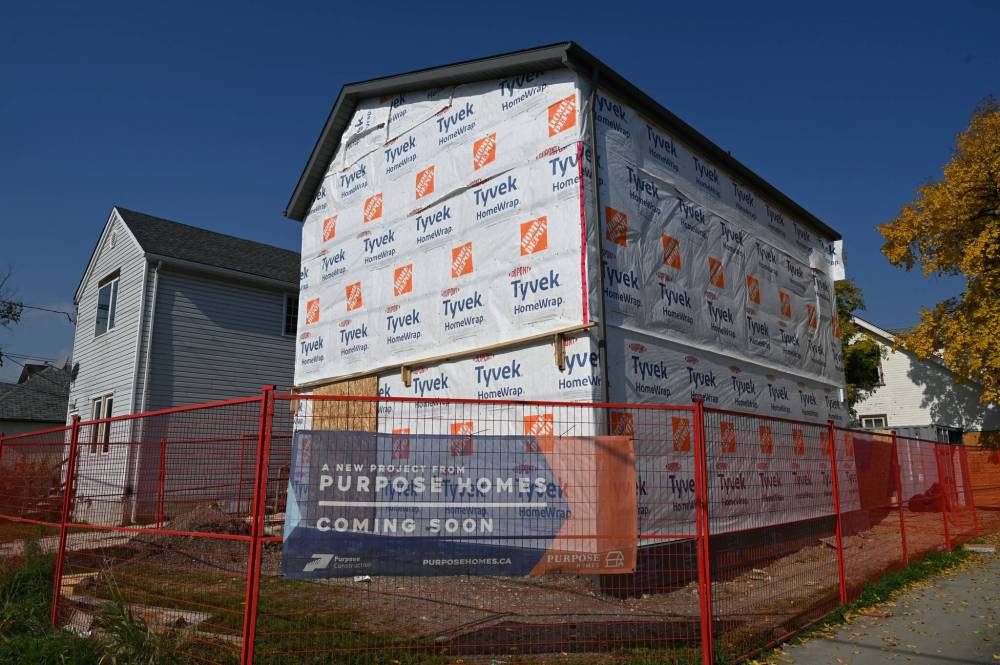Time to think ahead, not move backwards
Advertisement
Read this article for free:
or
Already have an account? Log in here »
To continue reading, please subscribe:
Monthly Digital Subscription
$0 for the first 4 weeks*
- Enjoy unlimited reading on winnipegfreepress.com
- Read the E-Edition, our digital replica newspaper
- Access News Break, our award-winning app
- Play interactive puzzles
*No charge for 4 weeks then price increases to the regular rate of $19.00 plus GST every four weeks. Offer available to new and qualified returning subscribers only. Cancel any time.
Monthly Digital Subscription
$4.75/week*
- Enjoy unlimited reading on winnipegfreepress.com
- Read the E-Edition, our digital replica newspaper
- Access News Break, our award-winning app
- Play interactive puzzles
*Billed as $19 plus GST every four weeks. Cancel any time.
To continue reading, please subscribe:
Add Free Press access to your Brandon Sun subscription for only an additional
$1 for the first 4 weeks*
*Your next subscription payment will increase by $1.00 and you will be charged $16.99 plus GST for four weeks. After four weeks, your payment will increase to $23.99 plus GST every four weeks.
Read unlimited articles for free today:
or
Already have an account? Log in here »
Hey there, time traveller!
This article was published 29/06/2023 (885 days ago), so information in it may no longer be current.
Perhaps the Manitoba government hasn’t noticed the record numbers of forest fires raging across Canada this year, the growth in extreme weather patterns around the world or rising ocean levels from sea ice and glacier melt.
The World Meteorological Organization says there is a 66 per cent chance average global temperatures will exceed 1.5 C above pre-industrial levels for at least one year between 2023 and 2027. There is a 98 per cent chance the five-year period will be the warmest on record. The average global temperature in 2022 was 1.15 C above pre-industrial levels.
Left unchecked, human induced climate change from heat-trapping greenhouse gases could see global temperatures exceed 1.5 C above pre-industrial levels more frequently, which would have far-reaching impacts on human health, food security, water management and the world’s ecosystems, the WMO predicts.
How much more evidence do governments and society need to convince them that the world is in a climate emergency and that everything possible must be done now — not tomorrow — to reduce greenhouse gas emissions?
Files Lowering standards for energy efficient homes is a step in the wrong direction.
It seems the Stefanson government is not entirely convinced, at least when it comes to energy efficiency standards in newly constructed buildings.
The province is planning to approve a new residential and commercial building code that will come into effect in 2024. As part of the proposed changes, government is considering adopting the lowest of five tiers for energy efficiency (Tier 1 being the lowest, Tier 5 the highest).
A Tier 5 build would reduce energy consumption by at least 60 per cent compared to a Tier 1 construction, according to government’s impact analysis.
That’s a significant difference considering the amount of natural gas used to heat homes in a cold climate like Manitoba.
Government says adopting a lower energy efficiency standard is not a step backwards because homebuilders already build at a Tier 2 or Tier 3 level. However, there are no guarantees that would continue if standards were lowered. Homebuilders could scale back energy efficiency to cut costs and improve profitability.
Manitoba is already lagging behind other Canadian jurisdictions and that watering down building codes would put the province even further behind.
The Stefanson government has not adequately explained why it’s planning to set standards so low. Provincial officials say they’re listening to the homebuilding industry who are calling for a “cautious approach” to setting energy efficiency standards. If that’s the case, government is putting the economic interests of industry ahead of the environment.
Sustainable building advocates, meanwhile, are calling on the province to adopt higher energy efficiency standards. They say Manitoba is already lagging behind other Canadian jurisdictions and that watering down building codes would put the province even further behind.
Considering the urgent need to reduce carbon emissions, allowing the building industry to construct homes with reduced energy efficiency would be a dereliction of duty. Government has a responsibility to serve the broader interests of society — in this case, the future health of the planet — not the narrow wishes of industry.
No single action or policy decision can reverse the effects of climate change. Only the collective will of government, industry and individuals pulling in the same direction can have an impact over time. However, each missed opportunity by government to establish important regulatory standards to reduce emissions will contribute to the increasingly disastrous effects of rising global temperatures.
It is not too late for the Manitoba government to change its mind and show that it’s serious about fighting climate change. It has the power to do so with the stroke of a pen.


